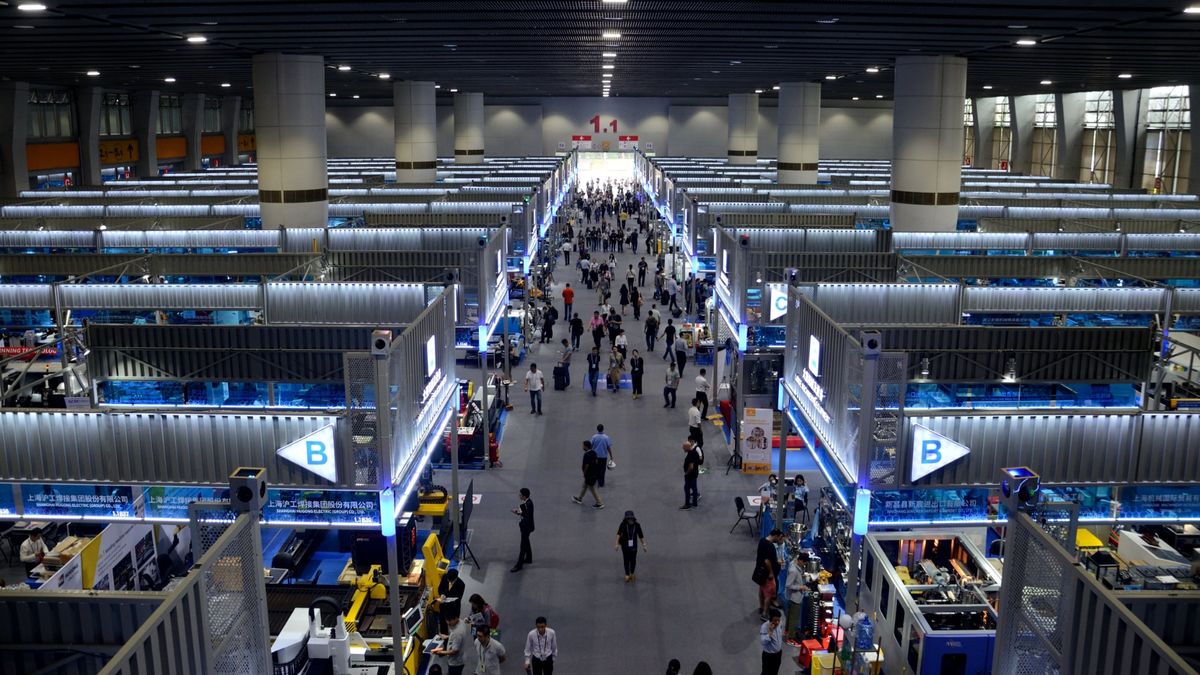Even coronavirus can't stop the massive Canton Fair trade expo
The world's largest trade show is going virtual, and may come away the better for it.

The world’s largest trade fair is going online, and the salespeople of Ningbo MH Industry have been drafted in to livestreaming bootcamp.
Carefully selected for English skills and winning personality, a few dozen budding influencers from the east-coast textile firm are being drilled to undergo an experiment unprecedented in the history of the Canton Fair.
The twice-annual trade meeting in the southern megacity of Guangzhou usually sees more than 200,000 foreign buyers cram into its exhibition halls, but this year the coronavirus has made that impossible.
Instead, the government has hired Tencent Holdings Ltd. to lay out a massive online livestream architecture to enable the same sort of interaction without the physical presence.
Spurred by the booming culture for live video merchandising in China, Canton Fair organizers went virtual, and it’s for this that Ningbo MH’s employees are training, with newly purchased video equipment, soft lighting and catchy welcome lines.
“With the lockdown everywhere in the world, we haven’t met with any clients since January,” said Wendy Ma, marketing manager at Ningbo MH. “We hope to tell them that we’re still here and please don’t forget us.”
Amid the novelty of the virtual surroundings, the stakes for many of China’s exporters couldn’t be higher. The collapse in global trade since the first quarter and the surge in unemployment at home mean that executives may not have the time to wait for re-openings in Europe and the U.S. to spur business again, and the online fair is a chance to make sales now.
“China’s exports are facing great downward pressure this year, as global demand is weakening due to the pandemic, coupled with the anti-globalization trend,” said Wang Youxin, a researcher at the Bank of China Institute of International Finance in Beijing.
A new way of selling
This year’s fair starts on June 15, and will feature the same range of consumer and industrial goods that usually stack the halls in the city’s exhibition grounds, just this time back in the warehouses and showrooms of the roughly 25,000 exhibitors across the country.
From power banks to hot tubs, from Christmas decorations to pallet jacks, from baby toys to pet food, many of the wares end up in big-box stores like those of Walmart and Costco as well as smaller retailers around the world.
In the online version, visitors begin their journey through the fair in a virtual “hall” packed with livestreaming sessions and company booths. Buyers with specific needs can navigate categories or search the exhibitors. The good news is less foot fatigue for visitors; the downside is no physical interaction with the merchandise.
Grace Gao, an export manager at Shandong Pangu Industrial, which makes tools like hammers and axes, has been busy preparing a virtual-reality video that showcases the factory and workers. The company also plans to feature five broadcasters to go live nonstop, ready to serve clients in any time zone.
“In the past, prospective clients can only see our products. But this year, via the online tools, they will instantly see our work environment,” said Gao. “This may foster trust more quickly.”
Virtual showrooms
Tech giant Tencent was appointed to design the infrastructure in mid-April. By then it was evident that the disease outbreak was gripping the entire world, making any physical trade fair out of the question.
The Shenzhen-based company uses its cloud and conferencing technology to enable matchmaking, presentations, negotiation and contracting. Besides livestreaming, buyers and exporters can use instant messaging to connect confidentially, and it also provides real-time translation services.
“Digital technology can greatly improve the flexibility, stability, and efficiency of exhibitions and reduce labor costs,” said Rita Zeng, vice president of Tencent Cloud. “A cloud fair is a new way to stabilize foreign trade.”
Some companies are going to great lengths to adapt to the new format. In Guangdong province, Lisa Song, an export director for an aluminum profile factory, said her firm has adopted traditional Chinese aesthetics for the online showroom.
While such a backdrop, with paintings, calligraphy and traditional costumes, would be rare in the functional exhibition hall, it may represent the emerging standard for online trade fairs.
It also poses an existential threat to the old model where buyers flew around the globe to meet producers, a practice that was already dented by the rise of online merchandising.
“When our clients have concerns, they can’t get a flight ticket immediately,” Song said. “In the future, we can do live chats in our showroom. The Canton Fair just pulled the trigger for us to start to try.”
This article is published under license from Bloomberg Media: the original article can be viewed here

06 Jun 2017
Total posts 56
Interesting. I was booked to go to the Canton Fair this April but obviously that didn't happen. Was still holding out hope for Global Sources in HK in October, but this may suit instead.
Hi Guest, join in the discussion on Even coronavirus can't stop the massive Canton Fair trade expo